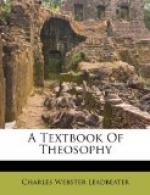Secondly, Theosophy never endeavours to convert any man from whatever religion he already holds. On the contrary, it explains his religion to him, and enables him to see in it deeper meanings than he has ever known before. It teaches him to understand it and live it better than he did, and in many cases it gives back to him, on a higher and more intelligent level, the faith in it which he had previously all but lost.
Theosophy has its aspects as a science also; it is in very truth a science of life, a science of the soul. It applies to everything the scientific method of oft-repeated, painstaking observation, and then tabulates the results and makes deductions from them. In this way it has investigated the various planes of Nature, the conditions of man’s consciousness during life and after what is commonly called death. It cannot be too often repeated that its statements on all these matters are not vague guesses or tenets of faith, but are based upon direct and oft-repeated observation of what happens. Its investigators have dealt also to a certain extent with subjects more in the range of ordinary science, as may be seen by those who read the book on Occult Chemistry.
Thus we see that Theosophy combines within itself some of the characteristics of philosophy, religion and science. What, it might be asked, is its gospel for this weary world? What are the main points which emerge from its investigations? What are the great facts which it has to lay before humanity?
They have been well summed up under three main heads.
“There are three truths which are absolute, and which cannot be lost, but yet may remain silent for lack of speech.
“The soul of man is immortal and its future is the future of a thing whose growth and splendour has no limit.
“The principle which gives life dwells in us and without us, is undying and eternally beneficent, is not heard or seen or smelt, but is perceived by the man who desires perception.
“Each man is his own absolute lawgiver, the dispenser of glory or gloom to himself, the decreer of his life, his reward, his punishment.
“These truths, which are as great as is life itself, are as simple as the simplest mind of man.”
Put shortly, and in the language of the man of the street, this means that God is good, that man is immortal, and that as we sow so we must reap. There is a definite scheme of things; it is under intelligent direction and works under immutable laws. Man has his place in this scheme and is living under these laws. If he understands them and co-operates with them, he will advance rapidly and will be happy; if he does not understand them—if, wittingly or unwittingly, he breaks them, he will delay his progress and be miserable. These are not theories, but proved facts. Let him who doubts read on, and he will see.




